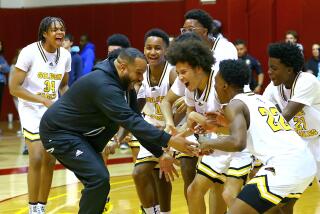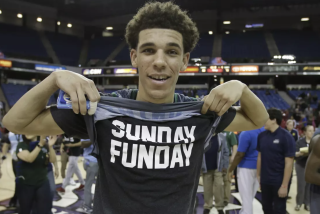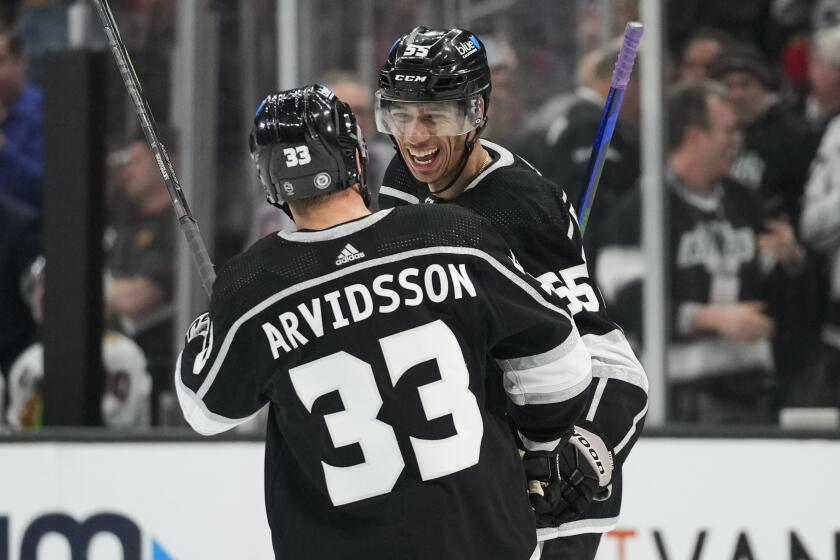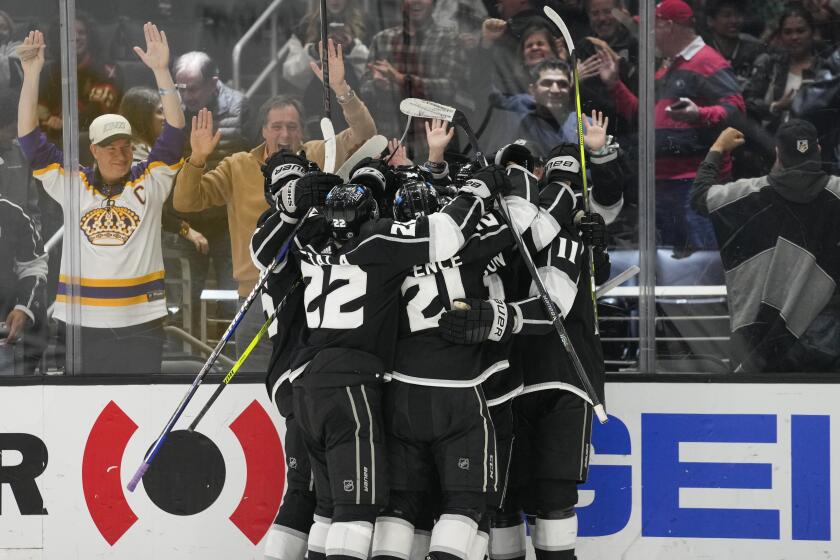For Cal State Northridge basketball player, an unspoken resolve
One glance at the sideline was all it took. Catching sight of the scowl on his coach’s face, Michael Lizarraga knew that he was about to get chewed out.
It had been that kind of night for the Cal State Northridge basketball player, a step slow and a second late, struggling to keep track of his man on defense.
“I tried to push myself,” he said. “I just wasn’t playing so good.”
Now he banged with his hips and elbows, using every inch of his 6-foot-7 frame to wrestle for position under the basket. A jump shot caromed off the rim, the ball hanging in midair.
Lizarraga’s opponent — a second-team all-conference player for UC Irvine — spun around him and grabbed the rebound.
“I didn’t box out,” Lizarraga said.
On the Northridge bench, Bobby Braswell clenched his fists. The coach is a big man who has no qualms about showing his displeasure. At the next timeout, he went straight for Lizarraga, glaring.
But just as Braswell seemed ready to let loose, he stopped and abruptly turned toward a smallish woman who stood behind the bench. The coach started hollering at her.
--
Close your eyes and listen to a basketball game.
Sneakers squeak across the wood floor. Maybe the school band is playing “Louie Louie.”
Listen more closely and you hear players chatter at one another, calling signals, yelling “I’ve got ball” on defense. Coaches bark instructions. Referees blow their whistles. Lizarraga hears none of it.
As the only deaf player at the men’s major college level, he has found a way to succeed without the basic input his teammates and opponents take for granted. Though his numbers fall short of spectacular, he has carved out a spot in the Matadors’ rotation, playing about 19 minutes a game, averaging about six points and four rebounds.
“There is a group we expect to have on the floor at the end of the game and that includes Mike,” his coach said. “He is one of our toughest guys.”
Lean and muscular, with a scruff of beard on his chin, the 21-year-old seems like any other player until you notice the woman — the one Braswell hollered at — gesturing to him from the sideline.
She is a sign-language interpreter, transmitting snippets of information on the fly, squeezing into the huddle to relay the coach’s words. But there is only so much she can do. The rest of the time, Lizarraga must fend for himself, watching for visual clues and trusting his instincts.
“How can I do it?” he said through the interpreter. “That’s a good question.”
--
Maybe he was born to play.
His father, an assistant coach at a Northern California high school in Dixon, used to bring him to practice and set the baby carrier on the sideline. As a toddler, Lizarraga rolled a ball — almost as big as him — around the gym.
Not until he reached 18 months did his parents, Tavo and Cari, realize he was not forming words like other children his age.
“We walked up behind him and clapped,” Tavo said. “He didn’t react.”
The same thing happened with the couple’s second child, Natalie. No one else in their family, no uncles or cousins, suffered from hearing loss.
“It ended up that we both carry a recessive gene,” Tavo said. “When you put those genes together, you get deaf kids.”
The children could not share their parents’ love of music — rock, rap, anything — but Lizarraga kept pursuing his dad’s favorite sport. The game made sense to him and if he tended to keep going a second or two past the referee’s whistle, well, that qualified as extra effort.
Through his teenage years, he moved between a team at the California School for the Deaf and an AAU squad of hearing players. People expected him to attend Gallaudet University, a prominent school for the hearing impaired in Washington, D.C., but Lizarraga had other plans.
“I wanted to play Division I basketball,” he said. “That was my dream.”
In the fall of 2007, he showed up at Northridge and asked to join the team as a walk-on. Braswell, who had seen him at an AAU tournament, knew he had talent.
The coach also knew Lizarraga was deaf because he had noticed Tavo interpreting at those AAU games. But there would be no father to help at college.
Lizarraga, who does not read lips, had to find someone else.
--
Growing up in Alaska, Erin Matthews knew only one deaf person. But the quirky young woman with tattoos and red hair had been a fan of Linda Bove, the deaf librarian on “Sesame Street,” and wanted to learn sign language.
That led her to Northridge, where she earned a degree in deaf studies, then took work as a classroom interpreter for the school’s National Center on Deafness, a program that helps hearing-impaired students. An incoming freshman caught her eye.
“He was going to play basketball,” she recalled. “I told the dispatch coordinator, ‘I want to do that.’ ”
Signing can be tricky in a sport where “driving” has nothing to do with cars and a “hedge” is not shrubbery, but rather a defensive maneuver. Lizarraga recalled: “I needed someone who could handle the language.”
He and Matthews set about developing their own vocabulary.
“The first couple of signs I did were so girly like,” she said. “When I signed ‘layup,’ I picked up my foot like a girl would. He just started laughing.”
They created shorthand to identify his teammates. For John Hayward-Mayhew, the one with the mole, she pointed to her upper lip. For Lenny Daniel, who never tucked his shirt in, she made an “L” by her waist.
Before long they could talk basketball quickly and efficiently, but they weren’t the only ones who needed to adapt.
The coach, who calls himself “a control kind of guy,” had to get used to this unfamiliar woman hovering close. “That first year, I think I bopped her once or twice, turning around and not realizing she was there,” he said.
Their triangular arrangement led to what has become a familiar, if somewhat comical, routine.
During games, when Braswell gets that sneer on his face, he must yell at Matthews — an odd sight from the stands — as she intently transmits every word. Lizarraga sometimes grows exasperated and turns away.
“Look at her,” Braswell hollers. “Look at her.”
--
Midway through the game at Irvine, the Matadors were rushing up court when Aqeel Quinn started yelling at the bench.
The guard pointed at Matthews, telling her of a quick change. She popped up, clasping her hands in front of her face, two fingers raised — the sign for “post and seal.”
“If I look over real fast while I’m running,” Lizarraga said, “I can see it.”
For the Matadors, playing with a deaf teammate has become second nature.
They know to catch his eye when signaling a play and to listen for his voice — a whoop that carries to the upper rows of any gym — when he needs help down low. Rashaun McLemore gives him a shove in the chest and gestures, urging Lizarraga to work harder for rebounds.
“I don’t know the sign language for it,” McLemore said. “But we understand each other.”
This makeshift communication carries into the locker room where players have learned bits of sign language, not enough to keep up with the effusive Lizarraga, his teeth clicking, hands working furiously through strings of words and sentences.
“I have a lot to say,” he explained. “All the time.”
Gestures and facial expressions fill the gaps. When all else fails, the players reach for their cellphones to text Lizarraga.
“Mike’s not the deaf person who sits in the corner and nobody talks to him,” teammate Daniel said. “He’s up and making jokes, playing around with the guys.”
Braswell can hear them laughing from out in the hall. He too has changed since Lizarraga arrived. Now, when he installs a new offense or reviews fundamentals, the coach tends to show more than tell.
“It helps the whole team, especially the younger guys,” he said. “I think I’m a better teacher.”
--
The way Lizarraga had started against Irvine — missed rebounds, silly fouls — he might have spent the second half on the bench. But with 10 minutes remaining, the Matadors clinging to a slim lead, Braswell sent him back in.
“Go out and do your job,” the coach said.
A rival fan tried to needle him, yelling from the stands. This happens regularly, eliciting grins from the rest of the Matadors. If nothing else, Lizarraga can play the game undistracted by the crowd, the band and trash-talking opponents.
“I just nod my head,” he said.
Taking his place at the center of the Northridge zone, he fought for every ball and forced Irvine’s high-scoring Eric Wise to miss. On an inbounds play, he whooped for someone to cover an unmarked man.
“I didn’t really care about offense,” he said. “I just focused on defense.”
The score was still close when he lunged to steal the ball and, falling out of bounds, whipped a behind-the-back pass to a teammate, leading to two quick points.
Guard Vinnie McGhee grabbed Lizarraga and looked him in the eye, mouthing the words “good job.” On the bench, Braswell sensed that his team had seized the momentum.
“That steal was huge,” he said. “A very big play.”
The Matadors held on for a 66-62 win, their first victory on the road in a difficult season. Lizarraga joined his teammates at midcourt, chest-bumping and hugging, smiles all around.
No interpretation was required.
david.wharton@latimes.com
twitter.com/LATimesWharton
More to Read
Get our high school sports newsletter
Prep Rally is devoted to the SoCal high school sports experience, bringing you scores, stories and a behind-the-scenes look at what makes prep sports so popular.
You may occasionally receive promotional content from the Los Angeles Times.






